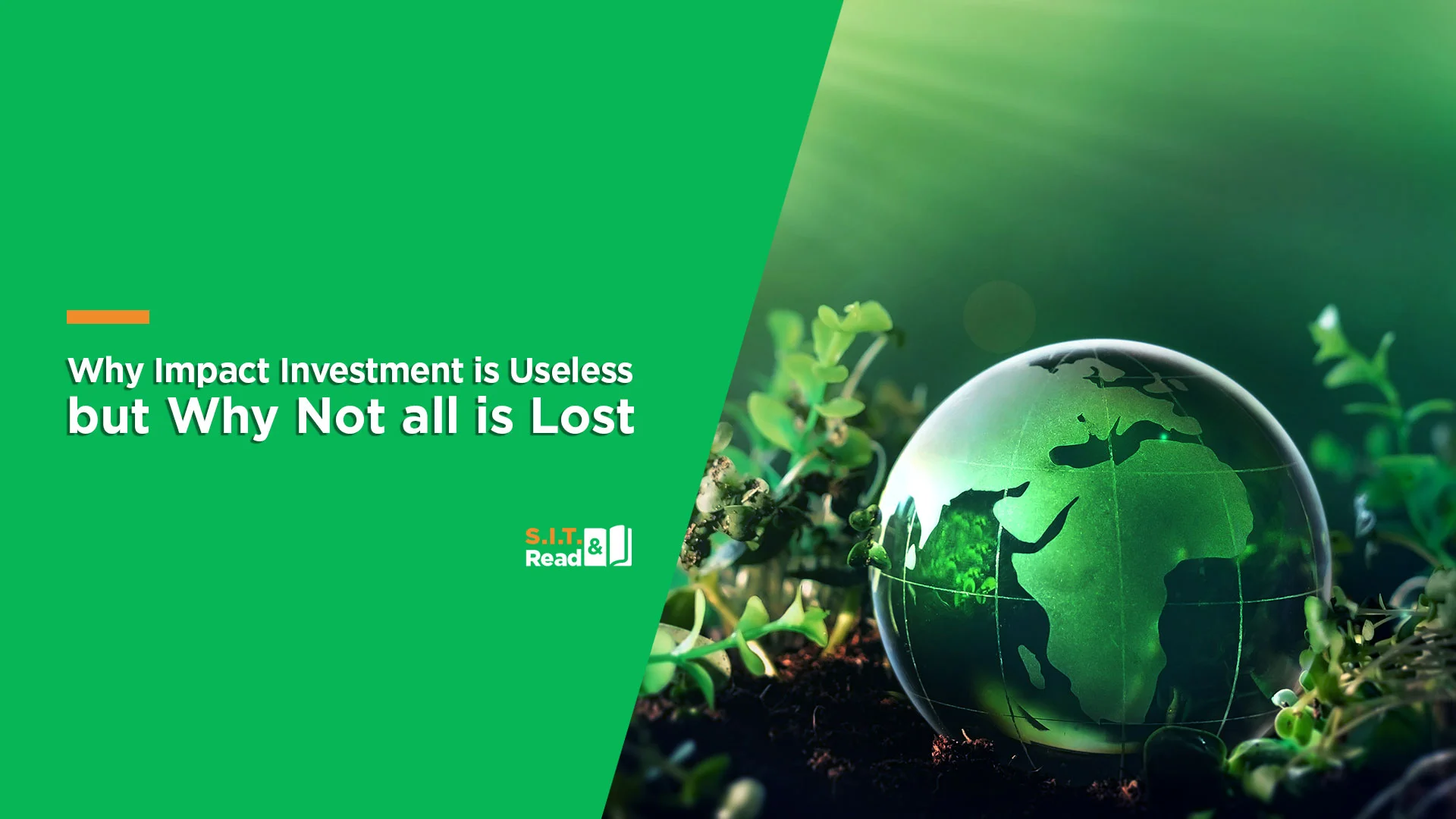Why Impact Investment is Useless but Why Not All is Lost


In August 2021, a 3-part longish article was published by Tariq Fancy, Ex-CIO for Sustainable Investing at BlackRock, considered to be the world’s largest asset management firm, with who’s-counting-many trillions of dollars under management. In the article, Fancy describes in detail why he decided to leave his well-remunerated and perkly-speaking-attractive job and denounce the practices which he was promoting during his 1 year and 9 months in the firm. It is a fascinating read which I strongly recommend:
https://medium.com/@sosofancy/the-secret-diary-of-a-sustainable-investor-part-1-70b6987fa139
The article develops an argument, which I will briefly expound here because of its importance, and will follow with a set of questions that I think are crucial to our thinking about solving the world’s most pressing crises. Some of the questions challenge Fancy’s argumentations, others aim to direct readers’ attention and thinking to its consequences.
The article is obviously way more detailed and nuanced than my brief exposition, providing the added pleasure of the author’s sardonically realistic descriptions of the financial milieu, from (literally) high-flying arrogant executives to well-intentioned svelte Swedes. So, make sure not to miss the original. The argument goes something like this:
1) The climate crisis is probably the number one threat that humanity is facing, and it is inextricably linked to several other crises, including extreme and growing inequality.
2) There is currently a strong effort to promote the idea that the business and financial sectors, through “sustainable investing… impact investing, ethical investing and environmental, social, and governance (“ESG”) investing”, are the ones who will extricate us from these crises.
3) This is part of a wider concept that is being touted, which is that the business sector can and is mending its ways by adopting the principle of doing well by doing good. Or, as Fancy says, “a new worldview that purpose and profits are not in conflict and that companies need to serve society rather than just their shareholders in order to prosper.”
4) Much of the article is dedicated to prove and demonstrate that this claim is utterly false, since the business sector is neither capable nor motivated to be guided by anything other than the quest for profit, which is in most cases strongly at odds with purpose. Fancy excels at enumerating some of the specific mechanisms of the hugely profitable (since it provides higher fees) but totally illusory business of “impact investing”, convincingly describing the lack of any known causal chain translating this kind of investment into even the slightest discernible change in environmental parameters.
5) “Impact”, “Green”, “Responsible”, “ESG” investments, promoted as a solution, are, therefore, utterly useless. Worse, they only serve to exacerbate the situation (even in the rare cases in which they are practiced with sincere intentions), by greenwashing the true picture while distracting the public into believing that the crisis is being resolved, and thus delaying and defanging any serious attempts at applying the only viable remedy, which is a complete overhaul of the rules of the game.
6) It should not come as a surprise that these “green” practices are useless: the business sector has no motivation whatsoever to solve the problem since the rules of the game are designed exclusively to incentivize financial gain at the expense of any other consideration. In fact, the game is set up to incentivize anti-ESG behavior. In addition – even if businesses were willing to solve humanity’s problems, why should we entrust them with our future? Their leaders have neither been elected to represent us nor naturally selected for their benign attitudes towards their fellow humans.
7) There is therefore, only one player who can, should and must shoulder the responsibility: government. For this to happen governments must take the initiative, change the rules for all players, and strictly enforce the new rules, forgetting about voluntary compliance.
8) In summary: it is unfair to the public, undemocratic, illogical and impractical to expect the leaders of the business community to extract us from the crisis they have led us into. Governments need to take the responsibility now!, change the rules and ruthlessly enforce the new ones.
To drive home his key message, Fancy utilizes an effective analogy: basketball players who are being paid for scoring more points than their rivals will use any means to do so if they can get away with it, even if this goes in the face of the generally accepted maxim that one should attempt to “play fair”. Acting otherwise would be irrational within the system in which they are embedded, and this holds for their coaches, managers and all other members of the “basketball ecosystem”. Back to the financial analogue, Fancy grimly states: “Unfortunately, many things that are lucrative are also bad for the world.”, which is, one supposes, why they are still happening despite humanity’s absolute necessity that they stop.
Why there may still be hope
1) One of the strongest critiques of the reigning economic model is its reliance on the Homo Ecomonicus model, the perception of humans as rational agents motivated solely by self-interest. This vision is so obviously skewed, that one can only wonder how it has managed to hold so many economics experts and “experts” in its thrall for so long. Surprisingly, Fancy’s powerful criticism of the system makes the same erroneous assumption (or maybe not surprising, given that he is – professionally speaking – a fruit of this very system). His main argument as to why businesses will never be able to extract us from our crises, is that the actors in the business-game, by its very design and rules, will never be incentivized to do so, because they are financially incentivized against it. But what if they will be motivated to fundamentally change in spite of it being against their self-interest, in the narrow sense of providing them financial gain?
2) To continue the previous point, why assume that human beings – even finance-sector-human-beings – will always seek only direct financial gain, while the (undoubtedly persistent) tendency to do so may be simply the result of a culture that could, in principle, be shifted through a combination of education, leadership, persistence, necessity and maybe some luck?
3) In 2007, I was facilitating a conference for a division of a large corporation providing harmful and profitable products to the market. The division’s president surprised his managers by agreeing to my suggestion that we close the yearly management conference with a video of Severn Cullis-Suzuki, who in 1992, at the age of 13, spoke to the assembly of the Earth Summit in Rio de Janeiro (as a “proto-Greta Thunberg”) against the preposterous state in which this generation was planning to leave the earth to hers. There was some discomfort in our corporate conference hall, but also a surprising amount of support and even empathy with the young speaker, and when I inquired about this surprising reaction, I was told that some of the managers were feeling uneasy lately because their high-school aged children were complaining that they were ashamed of sharing with classmates the information on where their parents worked. That’s one type of powerful, non-financial incentive, isn’t it?
4) Recruitment – another incentive. This is a complaint we were hearing in various industries, even before the so called “Big Resignation”. It is becoming more difficult to recruit and retain talent, especially in categories that are considered harmful or unethical. Hopefully, with the right education, it can become harder still.
5) The “Sting” argument, from the cold war, could be repurposed and (para)phrased as “I hope the CEOs love their children too”. One supposes they do, and that they also love their grandchildren. True, that if grandfather CEO amasses wealth today, future grandCEOchildren can be guaranteed a much safer existence than that of the regular grandchild-Joe, still the prospects for even a billionaire in 2060 seem quite grim, unless some profound change occurs.
6) Assuming you agree with the entire argument presented by Fancy about the impossibility of trusting the business community to be our savior, how much can you trust governments? The record of governments to date in taking full control of national economies is dismal. Not to say, as capitalists are wont to do, that the economic failure of socialist economies is a proof that any government-controlled economy must fail. Still, the onus is on governments to prove that they are able to steer an economy, especially in times of crisis.
7) Bernie Sanders’ analogy to WW2 comes to mind, re the ability of a country’s government and citizenry to unite in a no-holds-barred common effort to overcome a threat to its existence. Is it the lack of a “climate-Hitler”, someone to direct your anger onto and to focus your defensive aggression on, that is missing in today’s crisis, versus that of the Second World War?
8) Back to the role of businesses. What if, discarding the misguided interpretation by which business leaders are motivated exclusively by financial consideration, we conceived of a global all-encompassing cultural and mindset shift? What if the same kind of childish egotistical impulse that drives the Bezo’s, Musks and Bransons of the world to spend their billions just to be the first, the biggest, the most famous, could be transformed into a genuine competition for who is more… good?
9) The former point relates to the concept of “positive tipping points” i.e. the idea, as described for example by Timothy Lenton et. al., that “small interventions can trigger self-reinforcing feedbacks that accelerate systemic change” (Operationalising positive tipping points towards global sustainability). This challenges the maxim that only large-scale steps can tip the scales quickly enough to avert disaster and resonates with the intuition that complex systems can often be swayed by slight shifts to initial conditions.
10) What happens to all the thousands of businesses toiling away in an effort to do good within the current system? Those that are sincerely trying to connect profit with purpose, some even successfully, others ceding chunks of profits to gain bits of purpose? Are we to discourage them from sustaining these efforts, since we believe, as Fancy appears to claim, that their efforts are useless or worse? Doesn’t it feel that our world is better off when companies place themselves on a trajectory of giving up toxic practices and adopting better ones, albeit too slowly?
Considering both the limitations of relying on the business community for solving humanity’s crises, and the huge potential that lies with these powerful players, one suspects that a comprehensive solution may therefore be a combination of much stronger government-led regulation, tightly enforced, with strong public support, accompanied by massive work on a cultural and mindset shift in which individuals, organizations and businesses will be driven through a wide range of incentives to replace current harmful practices with activities that contribute to the well-being of the planet and the species that inhabit it.
Recent Posts
Innovation Behavior
Innovation is a skill, not a gift. Top organizations drive growth by nurturing and investing…
Should you learn TRIZ? – Yes. ….and No.
Are you in the world of problem solving? Is problem solving a skillset you have…
What Lies Ahead in 2024?
5 Data-Driven, Customer-Centric trends we’ve identified This is not just another conventional forecast. Over nearly…
Fork or Chopsticks – Which Innovation Tools Do You Use?
Imagine a chef, who only uses a spoon. Imagine a dentist, who only uses a…
The Moat Mentality: Exploring New Frontiers in Innovation Methodologies
In investing and business strategy, we often speak in terms of moats. Warren Edward Buffett…
Was it a Breakthrough or an Adjacency?
This year, P&G’s Febreze celebrates its silver anniversary as a brand. But not all 25…


